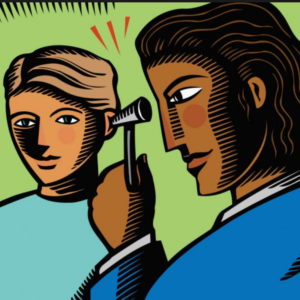As early as the first few months of life, hearing ability is crucial for development in children, especially in the areas of language and speech. Until recently, hearing issues in small children went largely undetected until the age of two years old–and this only when the child failed to begin talking on a normal schedule.
Research has indicated, however, that if hearing loss can be detected prior to six months of age, the child will have a much better chance of developing normally than if it is detected later. Now it is common practice in hospitals around the country to conduct infant hearing screening, and hearing loss has been treated and arrested at much younger ages than before.
Is Childhood Hearing Loss a Big Problem?
Hearing loss in infants is rare, but not as rare as you may think. Data indicates that out of every 1000 newborns, an average of 1.4 have hearing loss at birth. In older children, between the ages of three and 17, studies by the CDC have shown that about 5 out of every 1000 children suffer from hearing loss.
Children have been exposed to more excessive noise in the environment, which is the main cause of hearing loss in children. Unfortunately this damage to hearing is permanent, so the only current solution for noise-induced hearing loss is prevention.
What Causes Childhood Hearing Damage?
Besides noise-induced hearing loss, there are other types of hearing loss with various causes. And hearing loss can be conductive, sensorineural or mixed. Whatever the cause or type of hearing loss, it is important for parents and other caregivers know the signs so hearing loss in children can be halted and treated as soon as possible. Undiagnosed hearing damage can cause emotional and developmental issues in young children.
Congenital Hearing Loss
Congenital hearing loss is damage that was already present at birth. Causes can range from genetic and non-genetic factors, and are not always easy to identify.
Non-genetic factors can include birth complications, viruses and infections, or lack of oxygen during birth. Premature babies can also be at risk of hearing loss because of medications they may be given to help with respiration and other life-sustaining measures. Brain disorders and nervous system issues can also result in hearing damage, as can the use of over-the-counter pain medications by the mother during pregnancy. Maternal infections, diabetes, smoking or alcohol abuse during pregnancy can also cause issues.
Genetic factors are responsible for at least half of all hearing damage in children, no matter what the age. They include autosomal recessive hearing loss–resulting in a recessive gene carried by both parents, or autosomal dominant hearing loss–in which one parent carries a dominant hearing loss gene. Other genetic causes are syndromes such as Usher, Treacher Collins, Waardenburg, Down, Crouzon and Alport syndromes.
Acquired Hearing Loss
Hearing loss can also be acquired, caused by various factors. These may include exposure to loud noise, untreated ear infections, second-hand smoke, head injuries, over-the-counter (ototoxic) medications, a perforated ear drum, infections such as meningitis, measles, mumps or whooping cough, or other diseases.
Middle ear infections can also cause transient hearing loss, which while temporary, can interfere with development as well.
Screening for Children
Most hospitals perform hearing screening on infants within hours of birth, but sometimes hearing loss is not detected or it is developed later. If you suspect your child has an issue with hearing, have him or her screened by a pediatrician soon.
Watching for hearing and speech milestones as they grow can help you monitory your child’s hearing ability and progress. Here are a few milestones listed by ASHA:
From birth to four months, a good indication that your child has healthy hearing:
- Startles at loud sounds
- Wakes up or stir at loud noises
- Responds to your voice by smiling or cooing
- Calms down at a familiar voice
From four months to nine months, your infant should:
- Smile when spoken to
- Notice toys that make sounds
- Turn its head toward familiar sounds
- Make babbling noises
- Understand hand motions like the bye-bye wave
From nine to 15 months, your infant should:
- Make various babbling sounds
- Repeat some simple sounds
- Understand basic requests
- Use its voice to get your attention
- Respond to name
From 15 to 24 months, your infant should:
- Use many simple words
- Point to body parts when you ask
- Name common objects
- Listen with interests to songs, rhymes and stories
- Point to familiar objects you name
- Follow basic commands
Older children could also acquire hearing loss that is either permanent or temporary. Here are some things to look for if you think your toddler or preschool-age child might have hearing loss:
- Has difficulty understanding what people are saying.
- Speaks differently than other children her or his age.
- Doesn’t reply when you call his or her name.
- Responds inappropriately to questions (misunderstands).
- Turns up the TV volume incredibly high or sits very close to the TV to hear.
- Has problems academically, especially if they weren’t present before.
- Has speech or language delays or problems articulating things.
- Watches others in order to imitate their actions, at home or in school.
- Complains of ear pain, earaches or noises.
- Cannot understand over the phone or switches ears frequently while talking on the phone.
- Says “what?” or “huh?” several times a day.
- Watches a speaker’s face very intently – many children’s hearing loss escapes detection because they are very successful lip readers.
Los Gatos Audiology is here to help you protect your hearing and your health. Call today and come in for your yearly hearing exam so you can stay ahead of the curve and protect your hearing, your brain and your health.
We’ve served San Jose and the Bay Area for over 40 years, providing the right solution for Your Life. Your Style.


